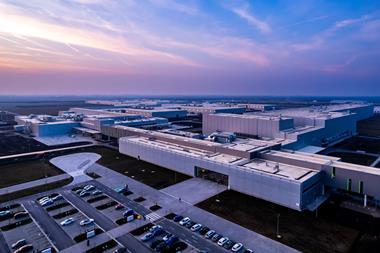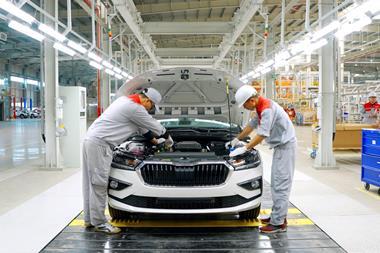 Russia – Daimler has announced the construction of a “fully flexible” car factory in the Moscow area, with an investment of over €250m ($278.1m). The plant will produce Mercedes-Benz E-Class sedans from 2019, followed by the GLE, GLC and GLS SUV models.
Russia – Daimler has announced the construction of a “fully flexible” car factory in the Moscow area, with an investment of over €250m ($278.1m). The plant will produce Mercedes-Benz E-Class sedans from 2019, followed by the GLE, GLC and GLS SUV models.
Covering 850,000 sq.m on the Esipovo industrial park, the operation will consist of a bodyshop, paintshop and assembly hall. The production will be managed by the newly established Mercedes-Benz Manufacturing RUS (MBMR), led by Axel Bense, who has lengthy experience of the Russian market.
Daimler says the plant will feature “state-of-the-art” technologies, Industry 4.0 methods and the capability to make several architectures on the same assembly line. Material flow will be automated, and warehouse baskets used to supply the lines will enable different model series and derivatives to be integrated into full production. A “one-roof” strategy will generate fast throughput times between the shops, short distances for workers and more efficient production. Furthermore, the Moscovia plant will be connected to all Mercedes-Benz sites worldwide, so that every robot and system can be controlled and reprogrammed remotely.
In order to be more environmentally friendly and use fewer resources, the new operation will also implement a “paperless factory” concept, use heat recovery in the paintshop and operate electric forklifts in logistics.
“Establishing a passenger-car production [plant] in Russia is a strategic investment in an important sales market for Mercedes-Benz,” said Markus Schäfer, member of the Divisonal Board of Mercedes-Benz Cars, Production and Supply Chain. “We are extending our local footprint and, at the same time, strengthening our global competitiveness.”
Andrej Vorobjov, governor of the Moscow region, promised “to render all assistance and provide all the conditions required” for the new factory to meet its planned start of operations. “We have already selected the educational organisations to provide training for specialists to work at the plant,” he added. According to Daimler, recruitment to fill the 1,000 new jobs at the plant will begin in 2017 and selected employees will be trained at existing Mercedes-Benz plants before spreading this knowledge among the workforce as “multipliers”.
Mercedes-Benz Cars currently has 29 production sites around the world and employs 78,000 people. The company turned out more than 2m Mercedes-Benz and smart cars last year, the sixth year of record production, and has quadrupled its Russian sales over the past decade.





































